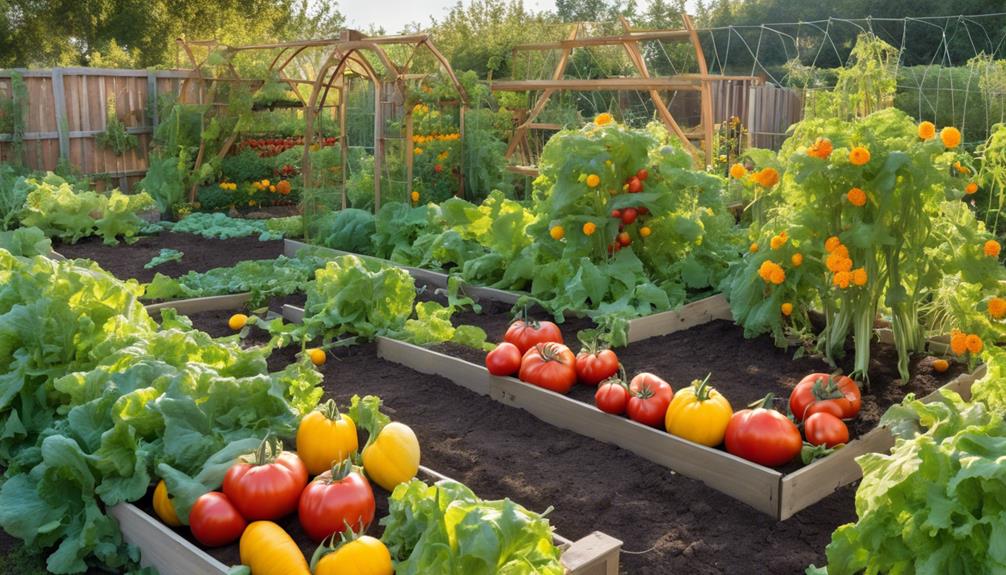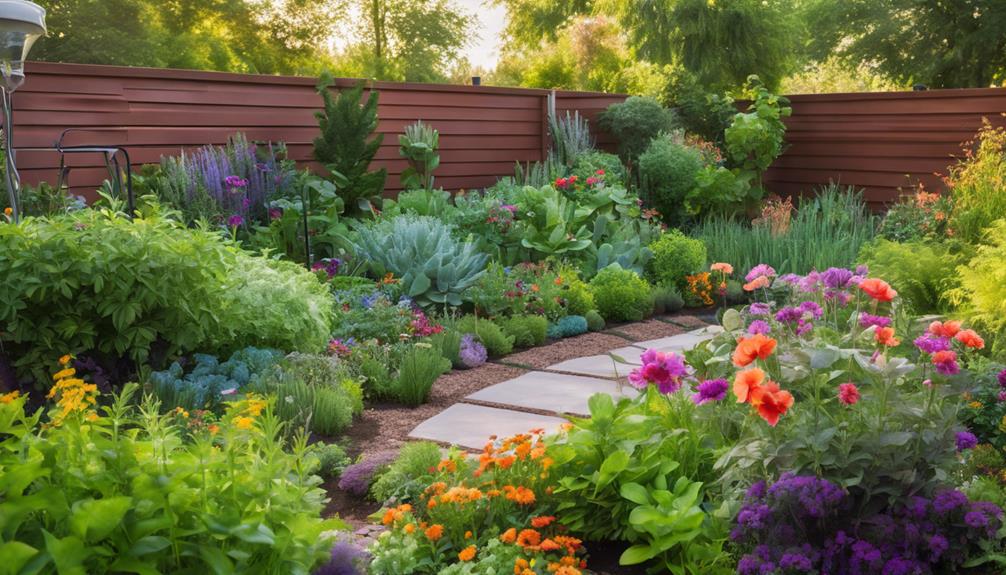
What to Know About Wooden Fencing Installation?
12 February 20257 Best Pressure Washing Techniques for Outdoor Sculptures
12 February 2025Building a sustainable garden care routine involves several key practices.
Start by focusing on soil health through composting, which enriches the soil and reduces waste. Incorporate native plants that require less maintenance and promote biodiversity.
Implement crop rotation to prevent nutrient depletion and pest build-up. Employ integrated pest management techniques, utilising natural predators and organic pesticides to protect beneficial organisms.
Regularly monitor plant health and adjust maintenance schedules seasonally. By emphasising these sustainable methods, you will create a thriving garden that benefits the environment.
To further enhance your knowledge, investigate supplementary strategies for long-term garden sustainability.
Sustainable Gardening Fundamentals
Sustainable gardening fundamentals are essential for creating an eco-friendly and productive garden.
Key practices such as composting not only enhance soil health but also reduce waste, while selecting native plants promotes biodiversity and requires less maintenance.
Understanding these principles is crucial for any gardener aiming to adopt a more sustainable approach.
Composting for Soil Health
Composting plays a crucial role in improving soil health, transforming kitchen scraps and garden waste into nutrient-rich organic matter. This process not only diverts waste from landfill but also enriches the soil, enhances its structure, and promotes biodiversity.
By incorporating a balanced mix of green materials, such as vegetable peelings, and brown materials, like dried leaves, gardeners can create a thriving compost heap that fosters microbial activity. The resulting compost boosts nutrient availability, supports water retention, and encourages beneficial organisms, such as earthworms.
Regularly applying compost to garden beds can significantly reduce the need for chemical fertilisers, leading to a more sustainable gardening practice. Mastery of composting techniques ultimately empowers gardeners to create a vibrant ecosystem, ensuring long-term soil health.
Native Plant Selection Benefits
Choosing native plants for your garden offers numerous ecological advantages that contribute to a healthier environment.
Native species are adapted to local soil, climate, and pests, which reduces the need for chemical fertilisers and pesticides. They foster biodiversity by providing vital habitats and food sources for indigenous wildlife, including pollinators such as bees and butterflies.
In addition, native plants typically require less water, making them an excellent choice for sustainable landscaping in arid regions. By selecting native flora, gardeners can improve soil health, support local ecosystems, and create a resilient garden that thrives with minimal intervention.
Ultimately, prioritising native plant selection is a significant strategy for achieving sustainability and ecological balance within your gardening practices.
Soil Health Management
Effective soil health management is essential for maintaining a thriving garden ecosystem.
Implementing practices such as organic compost application, strategic crop rotation, and integrated pest management can significantly improve soil fertility and resilience.
Organic Compost Application
The significance of soil is fundamentally enhanced through the application of organic compost, which acts as a cornerstone for sustainable garden care.
Organic compost enriches the soil, promoting microbial activity, boosting nutrient availability, and improving moisture retention.
To effectively implement organic compost application, consider the following key strategies:
- Select Quality Materials: Utilise a diverse range of organic waste, such as kitchen scraps and garden debris, to create a balanced compost mix.
- Maintain Correct Ratios: Ensure a proper carbon-to-nitrogen ratio (approximately 30:1) to optimise decomposition.
- Monitor Moisture Levels: Keep the compost pile moist but not saturated to facilitate microbial activity.
- Turn Regularly: Aerate the compost every few weeks to accelerate the breakdown process and enhance nutrient distribution.
Crop Rotation Strategies
Building upon the foundation established by organic compost application, implementing crop rotation strategies is integral to improving soil health and promoting sustainable gardening practices.
This method not only prevents nutrient depletion but also disrupts pest and disease cycles, fostering a resilient ecosystem.
Key crop rotation strategies include:
- Diverse Plant Families: Rotate crops from different plant families to minimise soil-borne diseases and nutrient imbalances.
- Cover Crops: Integrate cover crops during off-seasons to improve soil structure and boost nutrient availability.
- Nutrient Needs Assessment: Plan rotations based on the specific nutrient requirements of different crops to enhance soil fertility.
- Seasonal Timing: Consider seasonal variations in planting to optimise growth potential and resource utilisation.
Adopting these strategies will greatly contribute to long-term soil health.
Pest Management Techniques
While maintaining a sustainable garden care routine, implementing robust pest management techniques is essential for preserving soil health and ensuring the vigour of crops.
Effective pest management not only reduces pest populations but also fosters a balanced ecosystem, promoting beneficial organisms that improve soil fertility.
Consider the following techniques:
- Cultural Practices: Rotate crops and implement companion planting to disrupt pest life cycles.
- Biological Control: Introduce natural predators, such as ladybirds and parasitic wasps, to manage pest populations.
- Mechanical Methods: Utilise barriers like row covers and traps to physically prevent pests from accessing plants.
- Organic Pesticides: Apply environmentally friendly solutions, such as neem oil and insecticidal soap, to minimise harmful impacts on beneficial organisms.
Garden Planning Essentials
Effective garden planning is vital for establishing a thriving ecosystem in your outdoor space.
Key considerations include selecting the ideal location, implementing mulching techniques to retain moisture, and utilising companion planting strategies to improve growth and pest control.
Selecting Your Garden Location
Choosing the right location for your garden is vital for ensuring its success and sustainability.
A well-chosen site can optimise growth and minimise resource expenditure.
Consider the following factors when selecting your garden location:
- Sunlight Exposure: Ensure your garden receives adequate sunlight—most plants thrive in 6-8 hours of direct sunlight each day.
- Soil Quality: Test the soil for pH and nutrient levels; rich, well-draining soil promotes healthy root development.
- Water Accessibility: Proximity to a reliable water source is important for maintaining moisture without excessive effort.
- Wind Protection: Locate your garden in a sheltered area to minimise wind damage and prevent moisture loss.
Mulching for Moisture Retention
Moisture management is a crucial aspect of sustainable gardening, and mulching serves as an effective strategy to improve soil moisture retention. By covering the soil surface with organic or inorganic materials, gardeners can significantly reduce evaporation and maintain a consistent moisture level.
Consider the following benefits of mulching:
- Weed Suppression: A thick layer of mulch inhibits weed growth, reducing competition for water and nutrients.
- Temperature Regulation: Mulch helps to maintain stable soil temperatures, promoting healthy root development.
- Soil Enrichment: Organic mulches decompose over time, enriching the soil with essential nutrients.
- Erosion Control: Mulching protects the soil from wind and water erosion, preserving its structure and integrity.
Incorporating these practices ensures a more resilient and productive garden ecosystem.
Companion Planting Strategies
In the realm of sustainable gardening, companion planting emerges as a strategic approach that enhances plant health and productivity.
By carefully selecting plant pairings, gardeners can promote growth, deter pests, and encourage biodiversity.
Here are four effective companion planting strategies:
- Mutual Benefits: Pair basil with tomatoes to improve flavour and repel pests.
- Nutrient Sharing: Plant legumes, such as beans, alongside corn to naturally enrich the soil with nitrogen.
- Pest Deterrence: Incorporate marigolds to ward off nematodes and other harmful insects.
- Attracting Pollinators: Use flowers like borage and nasturtiums to attract beneficial insects that assist in pollination.
Implementing these strategies fosters a resilient ecosystem, ultimately leading to a more productive and sustainable garden.
Enhanced Plant Resilience
How can gardeners cultivate improved plant resilience in their green spaces? By implementing strategic practices that bolster the natural defences of plants, gardeners can foster a robust ecosystem. Key methods include selecting native species, enriching soil health, and practising crop rotation. These techniques not only fortify plants against environmental stressors but also promote biodiversity.
| Method | Benefit |
|---|---|
| Native Plant Selection | Adaptation to local conditions |
| Soil Enrichment | Improved nutrient availability |
| Crop Rotation | Reduced disease incidence |
| Mulching | Moisture retention and weed suppression |
Sustainable Pest Control Methods
Effective pest control is crucial for maintaining a healthy garden while minimising environmental impact.
Sustainable methods such as neem oil treatment, the release of beneficial insects, and the application of diatomaceous earth can significantly reduce pest populations without harming the ecosystem.
Neem Oil Treatment
One of the most versatile and eco-friendly solutions for managing pests in the garden is neem oil, derived from the seeds of the neem tree. Its active compounds disrupt the life cycle of harmful insects while being safe for beneficial species.
To effectively utilise neem oil in your garden care routine, consider the following steps:
- Dilution: Mix neem oil with water, following the recommended ratio to ensure proper application.
- Application Timing: Apply during early morning or late evening to minimise the risk of leaf burn and optimise effectiveness.
- Frequency: Reapply every 7-14 days, especially after rainfall, to maintain pest control.
- Targeted Treatment: Focus on infested areas to reduce waste and improve efficacy.
Incorporating neem oil into your sustainable practices promotes a healthy garden ecosystem.
Beneficial Insect Release
Utilising beneficial insects in your garden can greatly enhance sustainable pest control efforts. By introducing these natural allies, you can create a balanced ecosystem that minimises the need for chemical interventions.
Here are four key beneficial insects to consider releasing:
- Ladybirds: Effective predators of aphids and other soft-bodied insects.
- Lacewings: Their larvae consume a variety of pests, including thrips and spider mites.
- Parasitic Wasps: These tiny wasps target specific pests, such as caterpillars and whiteflies, laying eggs inside them.
- Nematodes: Beneficial microscopic worms that attack soil-dwelling insect larvae, including grubs and root weevils.
Incorporating these beneficial insects into your garden care routine fosters a healthy environment, reduces pest populations, and promotes biodiversity.
Diatomaceous Earth Sprinkling
Diatomaceous earth, a natural powder derived from fossilised algae, serves as an efficient and environmentally friendly pest control method in sustainable gardening.
Its effectiveness lies in its abrasive properties, which damage the exoskeletons of insects, leading to dehydration and death without harming beneficial organisms.
To incorporate diatomaceous earth effectively, consider the following steps:
- Identify Target Pests: Determine which pests you need to control for optimal application.
- Choose Application Method: Utilise a sprinkle method or a dust applicator for even coverage.
- Apply in Dry Conditions: Ensure the garden is dry, as moisture reduces effectiveness.
- Reapply After Rain: Refresh the application after significant rainfall to maintain pest control.
Pest Infestation Management Strategies
Effective pest infestation management strategies are crucial for maintaining a healthy garden ecosystem.
Introducing natural predators, encouraging biodiversity through diverse planting, and attracting beneficial pollinators can significantly reduce pest populations while promoting overall garden health.
Natural Predator Introduction
Implementing a strategy for the introduction of natural predators can greatly enhance a garden's ecological balance while effectively managing pest infestations.
This sustainable approach utilises the natural relationships between species, fostering a self-regulating ecosystem.
To successfully introduce natural predators, consider the following steps:
- Identify Target Pests: Understand the specific pests affecting your garden to select appropriate predators.
- Research Compatible Predators: Choose species that coexist harmoniously with your existing flora and fauna.
- Create a Suitable Habitat: Ensure an environment that supports the survival and reproduction of the introduced predators.
- Monitor and Adjust: Regularly observe predator and pest populations, adjusting your strategy as necessary to maintain balance.
Encouraging Biodiversity Through Planting
One of the most impactful strategies for managing pest infestations in a garden is to encourage biodiversity through thoughtful planting. By incorporating a diverse array of plant species, gardeners can create a balanced ecosystem that naturally suppresses pest populations.
Here are four effective practices to improve biodiversity:
- Intercropping: Mix different crops in close proximity to disrupt pest lifecycles and reduce their prevalence.
- Native Plants: Select indigenous species that provide habitat and food for native predators and pollinators.
- Companion Planting: Pair plants that naturally repel pests or attract beneficial insects, fostering symbiotic relationships.
- Seasonal Rotation: Change plant varieties each season to prevent pests from establishing themselves and taking root.
Implementing these strategies cultivates resilience within your garden, ultimately leading to healthier plants and reduced pest pressure.
Attracting Beneficial Pollinators
Pollinators play a crucial role in maintaining the health and productivity of gardens, making their attraction a significant component of pest infestation management strategies.
By fostering a diverse ecosystem, garden caretakers can naturally suppress pest populations while enhancing plant vigour.
Here are four effective methods to attract beneficial pollinators:
- Diverse Plant Selection: Incorporate a variety of flowering plants that bloom at different times to provide continuous food sources.
- Native Plants: Utilise native species, as they are more appealing to local pollinators.
- Chemical-Free Practices: Avoid pesticides that harm pollinators, opting for organic alternatives instead.
- Habitat Creation: Provide nesting sites through features like bee hotels and diverse ground cover.
Implementing these strategies will not only support pollinator health but also promote a thriving garden ecosystem.
Why Choose TKL Birmingham Gardener
Why should you trust TKL Birmingham Gardener for your sustainable garden care needs?
With a commitment to eco-friendly practices, TKL Birmingham Gardener employs a holistic approach, ensuring your garden thrives whilst respecting the environment.
Our team of skilled horticulturists is dedicated to implementing sustainable techniques, such as organic pest control, water conservation, and soil health management.
We prioritise the use of native plants and biodiversity, creating resilient ecosystems that flourish naturally.
Our extensive knowledge allows us to tailor solutions to your garden's unique requirements, optimising growth and minimising environmental impact.
TKL Birmingham Gardener not only enhances the aesthetic appeal of your landscape but also fosters a sustainable relationship with nature, empowering you to cultivate a flourishing garden for generations to come.
Common Gardening Questions Answered
Gardening often raises a multitude of questions, from basic care techniques to advanced ecological practices.
One common inquiry is about soil health; understanding its composition and fertility is essential for ideal plant growth. Regular soil testing can reveal nutrient deficiencies and pH levels, guiding appropriate amendments.
Another frequent question pertains to pest management; employing integrated pest management (IPM) strategies minimises chemical use while effectively controlling infestations.
Furthermore, gardeners often seek guidance on watering techniques; utilising deep watering methods encourages robust root systems and drought resistance.
Garden Maintenance Schedule Creation
A well-structured garden maintenance schedule is crucial for ensuring the health and vigour of your plants throughout the growing season.
A systematic approach not only promotes growth but also mitigates potential issues. Here are key components to include in your schedule:
- Weekly Inspection: Regularly assess your plants for pests, diseases, and general growth.
- Watering Regimen: Establish a consistent watering schedule based on plant needs and seasonal changes.
- Fertilisers Plan: Apply organic fertilisers during critical growth phases to improve nutrient availability.
- Pruning and Weeding: Schedule routine pruning and weeding sessions to maintain plant health and garden aesthetics.




